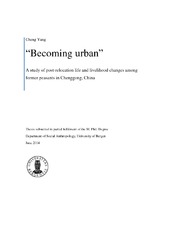| dc.description.abstract | This thesis presents an ethnographic study of post-relocation life and livelihood of the land-lost peasants" in Chenggong, China. The wider context for my study is the ongoing process of urbanization in the country. Drastic urbanization all over China during the last two decades has produced land-lost peasants" as a new group of subjects within the Chinese rural population, a group that saw their land appropriated in the name of development. The land has been taken by the state, referring to the reality of state land-tenure in China, while the peasants got cash compensation in return, as part of their relocation. Many studies of such urbanization processes have shown that the loss of land and the relocation often have caused poverty and the rupture of the village collective. Urbanization in China has therefore been interpreted as processes of state power and discipline in China and cases of popular resistance against such state power. My study is part of this Chinese story of urbanization, but my empirical findings modify the impression that all urbanization in China only leads to negative problems for the people involved. Kunming's urban expansion plans to include Chenggong, a well-known agricultural county, as its sixth district with its new municipal government complex and a college town. The villagers of this study come originally from three adjacent villages that lost their land for the construction of the college town and who were subsequently relocated to the same resettlement residential compound located among the college campuses. Villagers are supposed to live like urbanites in this urban residential compound, but my study shows that the standardized urban residential compound and urban settings do not urbanize people immediately. Instead, they manage to revive their village ways of life, and to continue to value their social network within it. Sponsored by the local state, some villagers continue as peasants in neighboring counties. These farming entrepreneurs lead a semi-rural and semi-urban life, yet they become used in state propaganda in the media as typical evidence of how urbanization actually benefits land-lost peasants. The remaining majority of villagers stay in Chenggong to exploit the local markets in various ways, for labor as well as for commercial activities. A close relationship emerges between land-lost peasants and the local urbanization in that villagers' wealth (wage, property value, collective dividend) is closely related to the development of Chenggong. Based on the ethnographic study, I argue that the re-territorialization of land-lost peasants in Chenggong after relocation is not only a top-down process, defined by the state. Rather, it is achieved based on local dynamics, which include the locational advantage, the special nature of the college town, the intervention of local policies and, most importantly, the agency of the people themselves. In conclusion, I reflect on the way the ongoing urbanization process I have observed in Chenggong relates to broader processes of rural subject making in the history of socialist China. I conclude that my case shows that a new subjectivity may emerge among land-lost peasants in Chenggong, a subjectivity which may move people in directions not envisaged by the Chinese state. The key element here is variation - as the effects of such changes will vary between the sexes, across generations and with available economic... | en_US |
